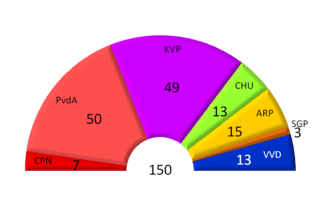| ||||||||||||||||||||||||||||||||||||||||||||||||||||||||||||||||||||||||||||
| Turnout | 83.5% | |||||||||||||||||||||||||||||||||||||||||||||||||||||||||||||||||||||||||||
|---|---|---|---|---|---|---|---|---|---|---|---|---|---|---|---|---|---|---|---|---|---|---|---|---|---|---|---|---|---|---|---|---|---|---|---|---|---|---|---|---|---|---|---|---|---|---|---|---|---|---|---|---|---|---|---|---|---|---|---|---|---|---|---|---|---|---|---|---|---|---|---|---|---|---|---|---|
This lists parties that won seats. See the complete results below. | ||||||||||||||||||||||||||||||||||||||||||||||||||||||||||||||||||||||||||||
 Seats | ||||||||||||||||||||||||||||||||||||||||||||||||||||||||||||||||||||||||||||
| ||||||||||||||||||||||||||||||||||||||||||||||||||||||||||||||||||||||||||||
Early general elections were held in the Netherlands on 29 November 1972. [1] The Labour Party (PvdA) remained the largest party, winning 43 of the 150 seats in the House of Representatives. [2]

The Netherlands is a country located mainly in Northwestern Europe. The European portion of the Netherlands consists of twelve separate provinces that border Germany to the east, Belgium to the south, and the North Sea to the northwest, with maritime borders in the North Sea with Belgium, Germany and the United Kingdom. Together with three island territories in the Caribbean Sea—Bonaire, Sint Eustatius and Saba— it forms a constituent country of the Kingdom of the Netherlands. The official language is Dutch, but a secondary official language in the province of Friesland is West Frisian.
The Labour Party is a social democratic political party in the Netherlands.
The elections led to a five-party coalition government consisting of the PvdA, the Catholic People's Party, the Anti-Revolutionary Party, the Political Party of Radicals and Democrats 1966 with the PvdA's Joop den Uyl as Prime Minister.

The Catholic People's Party was a Catholic Christian democratic political party in the Netherlands. The party was founded in 1945 as a continuation of the Roman Catholic State Party, which was a continuation of the General League of Roman Catholic Caucuses. During its entire existence, the party was in government. In 1980 the party merged with the Anti-Revolutionary Party (ARP) and the Christian Historical Union (CHU) to form the Christian Democratic Appeal (CDA).

The Anti-Revolutionary Party was a Protestant Christian democratic political party in the Netherlands. The party was founded in 1879 by Abraham Kuyper, a neo-Calvinist theologian and minister. In 1980 the party merged with the Catholic People's Party (KVP) and the Christian Historical Union (CHU) to form the Christian Democratic Appeal (CDA).

The Political Party of Radicals was a progressive Christian and green political party in the Netherlands. The PPR played a relatively small role in Dutch politics and merged with other left-wing parties to form GreenLeft in 1991.












